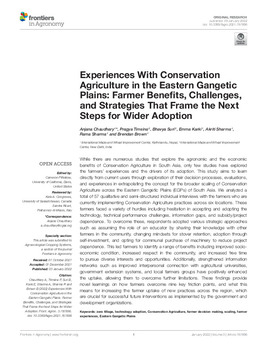Mostrar el registro sencillo del ítem
Experiences with conservation agriculture in the Eastern Gangetic Plains: farmer benefits, challenges, and strategies that frame the next steps for wider adoption
| Creador: | Chaudhary, A. |
| Creador: | Timsina, P. |
| Creador: | Suri, B. |
| Creador: | Karki, E.S. |
| Creador: | Sharma, A. |
| Creador: | Sharma, R. |
| Creador: | Brown, B. |
| Año: | 2022 |
| URI: | https://hdl.handle.net/10883/21820 |
| Lenguaje: | English |
| Editor: | Frontiers |
| Copyright: | CIMMYT manages Intellectual Assets as International Public Goods. The user is free to download, print, store and share this work. In case you want to translate or create any other derivative work and share or distribute such translation/derivative work, please contact CIMMYT-Knowledge-Center@cgiar.org indicating the work you want to use and the kind of use you intend; CIMMYT will contact you with the suitable license for that purpose |
| Tipo: | Article |
| Lugar de publicación: | Switzerland |
| Volumen: | 3 |
| DOI: | 10.3389/fagro.2021.787896 |
| Palabras Claves: | Technology Adoption |
| Palabras Claves: | Farmer Decision Making |
| Palabras Claves: | Scaling |
| Palabras Claves: | Farmer Experiences |
| Descripción: | While there are numerous studies that explore the agronomic and the economic benefits of Conservation Agriculture in South Asia, only few studies have explored the farmers' experiences and the drivers of its adoption. This study aims to learn directly from current users through exploration of their decision processes, evaluations, and experiences in extrapolating the concept for the broader scaling of Conservation Agriculture across the Eastern Gangetic Plains (EGPs) of South Asia. We analyzed a total of 57 qualitative and semi-structured individual interviews with the farmers who are currently implementing Conservation Agriculture practices across six locations. These farmers faced a variety of hurdles including hesitation in accepting and adopting the technology, technical performance challenges, information gaps, and subsidy/project dependence. To overcome these, respondents adopted various strategic approaches such as assuming the role of an educator by sharing their knowledge with other farmers in the community, changing mindsets for stover retention, adoption through self-investment, and opting for communal purchase of machinery to reduce project dependence. This led farmers to identify a range of benefits including improved socio-economic condition, increased respect in the community, and increased free time to pursue diverse interests and opportunities. Additionally, strengthened information networks such as improved interpersonal connection with agricultural universities, government extension systems, and local farmers groups have positively enhanced the uptake, allowing them to overcome further limitations. These findings provide novel learnings on how farmers overcome nine key friction points, and what this means for increasing the farmer uptake of new practices across the region, which are crucial for successful future interventions as implemented by the government and development organizations. |
| Agrovoc: | ZERO TILLAGE |
| Agrovoc: | TECHNOLOGY |
| Agrovoc: | INNOVATION ADOPTION |
| Agrovoc: | CONSERVATION AGRICULTURE |
| Agrovoc: | DECISION MAKING |
| Agrovoc: | FARMERS |
| ISSN: | 2673-3218 |
| Revista: | Frontiers in Agronomy |
| Número de artículo: | 787896 |
Ficheros en el ítem
Este ítem aparece en la(s) siguiente(s) colección(ones)
-
Socioeconomics
Including topics such as farming systems, markets, impact & targeting, innovations, and GIS

